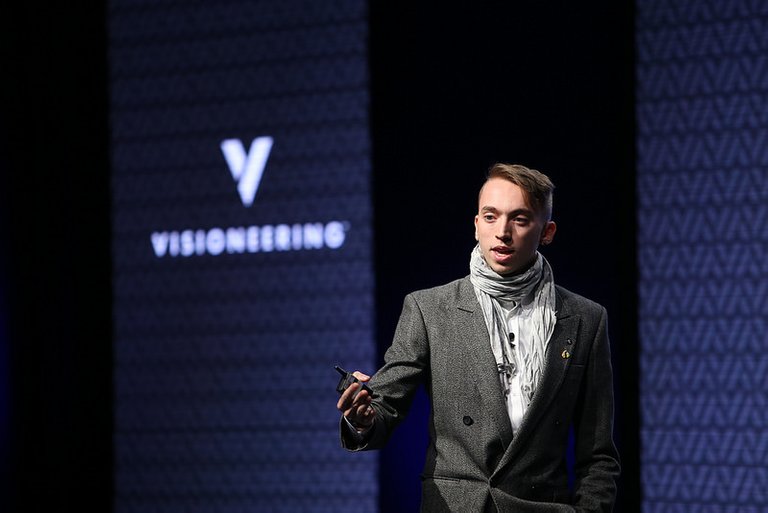
It's not everyday that you get to see the future happening right before your eyes. We're so focused on the day to day, paralyzed by uninformative and amygdala-stimulating news reports, that we rarely allow ourselves to take some time off to think about the future of humanity. The challenges we face today seem so out of our reach, and we feel so insignificant, that even when we do ponder about what's coming next, it's no more than a mere intellectual exercise.
However, there are people who not only think about the future constantly, but proactively make plans on how to improve it, and often deliver on the promises. Last year I was privileged enough to be part of such a group at the XPRIZE VISIONEERING conference in Los Angeles.
And here I am now, sharing this story with the Steemit community 😊
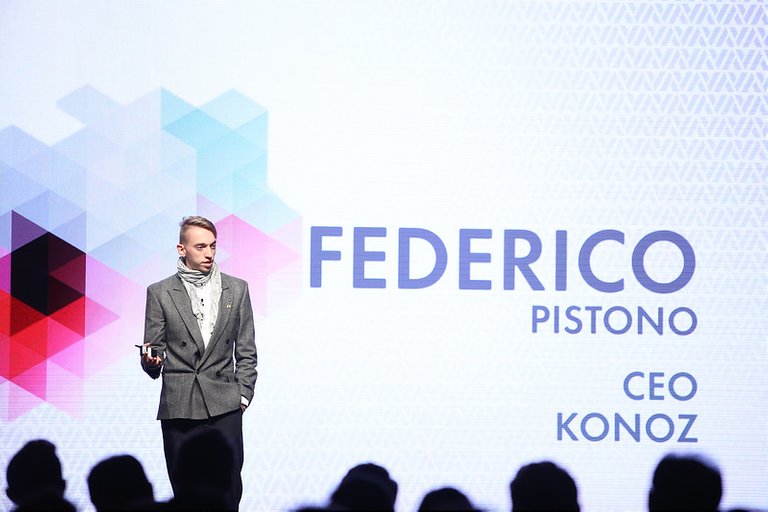
XPRIZE is the child of my dear friend Peter Diamandis, and what this project has accomplished in just a few years is nothing short of extraordinary. The story goes that Peter's childhood dream was to become an astronaut, but he didn't qualify for NASA's standards of physical aptitude. So he decided he would go to space himself.
Most people would stop at that thought, knowing that it would remain a child's dream and nothing more. Then again, Peter is not like most people. He was so determined to go to space so much that over the past twenty years he almost single-handedly rekindled global interest for space exploration. The 1996 Ansari XPRIZE – a $10-million prize awarded to the first privately financed team that could build and fly a three-passenger vehicle 100 kilometers into space twice within two weeks – was the reason that led Richard Branson to start Virgin Galactic and his private space enterprise, and many say it gave Elon Musk the inspiration to pursue Space X.
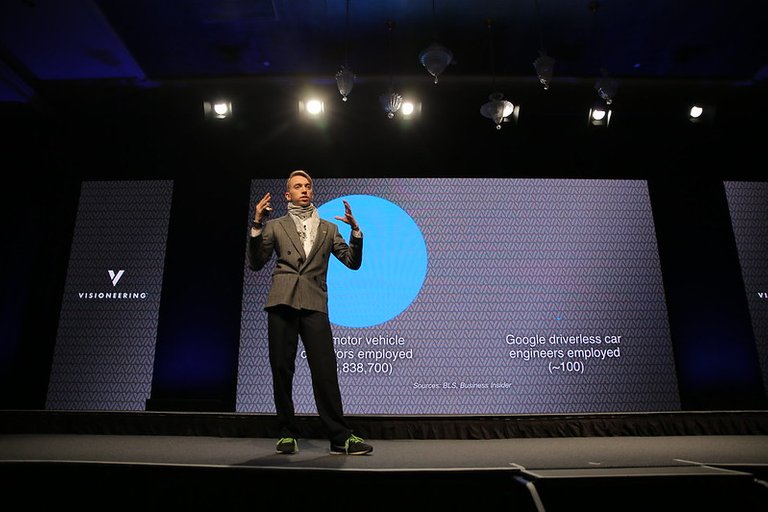
Since then, XPRIZE has become the new standard for disrupting innovation in areas where things had been stagnating for decades, either due to market failures or because of circumstances beyond any individual's control. The concept is simple: put out a $10/$20 million prize for the first team to do X, x being whatever currently unresolved challenge humanity is facing. Many teams compete in a friendly "coopetition", but only the best wins. The genius idea behind this approach is that the total amount of capital spent and value generated is much greater than the prize to be won. Teams collectively spend huge amounts of money, sometimes hundreds of millions of dollars, in the off-chance of taking home the $10 million prize. But in the process, they jumpstart in their country and community an ecosystem of innovation in a sector that had been stagnating for years. The winners will open source their technology for the benefit of all humanity.

Since its creation, XPRIZE projects include:
- super-efficient vehicles that achieve 100 MPGe (2.35 liter/100 kilometer) efficiency, produce less than 200 grams/mile well-to-wheel CO2 equivalent emissions, and could be manufactured for the mass market
- successfully launching, landing, and operating a rover on the lunar surface.
- doubling the industry's previous best oil recovery rate tested in controlled conditions by exceeding 2500 gallons per minute (with at least 70% efficiency of oil collected over water)
- a mobile device that can diagnose patients better than or equal to a panel of board certified physicians
free Android apps to spread reading, writing, and arithmetic skills, and prove their effectiveness over an 18-month period in African pilot communities
The list keeps growing every year.
So how do they decide what the next XPRIZE is going to be? Every year the team organizes in Los Angeles a two-day retreat called, quite appropriately, VISIONEERING. In the spirit of friendly coopetition, visioneers form teams and compete for the best idea, voting democratically at each stage. Some of these ideas might go on to become the next XPRIZE.
This year I was asked to lead the Future of Work session as visiting expert.
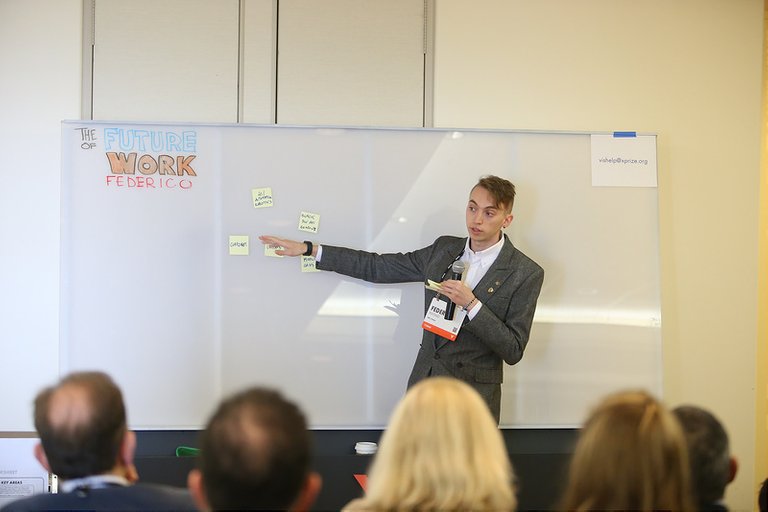
The best part about this gathering is the honesty and bluntness of the conversations. There is no shortage of events where powerful and influential people meet and try, or at least claim to, find solutions to global challenges. More often than not, these so called "global meetings" are full of political chit-chat and diplomatic equilibria, and nothings gets done. Nobody can say what they really think, and the few who do are either outright ignored, or cheerfully applauded and then ignored. At VISIONEERING this was the polar opposite. Since nobody had any obligation to be there or to represent the interest of a specific group, we could be brutally honest in what we said and how we treated each other. It didn't really matter how many billions of dollars you had on your bank account, or if you had a particular agenda to push forward. It was a pure competition of ideas for the benefit of mankind, and even in what was potentially one of the most ego-filled rooms in the world, I found it remarkable how people quickly recognized that someone else had a better idea, and would drop their original proposal for a better one.
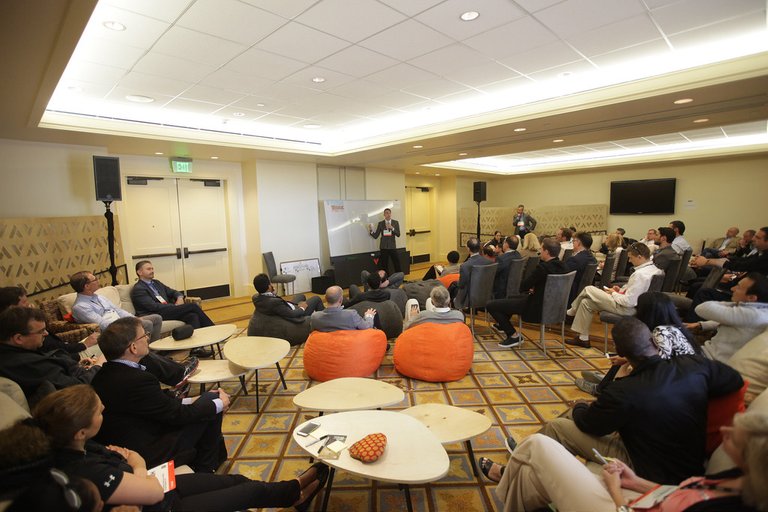
It was very humbling, and it happened to me thrice. The first time was when I was leading the group on the Future of Work. As visiting expert, my role was to help guide the discussion, give insights, data points, and create connections, not give solutions or impose my view on the participants. I resisted that urge several times during the session. The whole point of this exercise in creativity is to explain what the intended outcomes are, and let visioneers come up with a workable XPRIZE, which should have clear goals and measurable objectives, but should not by any means hint at a particular implementation or solution.
Let me give you an example. Suppose we want to clean up the ocean in case of an oil spill. An ill-designed XPRIZE would say something like — the winning team will design a better model of this particular machine, using this specific technology that would capture water in such a way, etc. You get the idea.
Conversely, a well-designed XPRIZE would go as follows — the winning team will create a scalable technology that at least doubles the current standard for cleanup rate all other things being equal or better. It has a clear, measurable goal (at least double the cleanup rate), it's audacious but not too impossible, it's specific enough to be experimented on scientifically, but broad enough to give space for the creativity of teams to come up with innovative and out of the box solutions.
In my team Future of Work, the job was a lot tougher. The subject is so broad and complex that it has ramifications far beyond a single objective, there is a lot of systems thinking involved with non-trivial consequences down the road, which are highly unpredictable. There is solid research, including from my own work, suggesting that within the next two decades about 50% of all jobs will be automated, with relatively few new occupation being created (maybe 5%), with a net loss of 45% of jobs that will be irreversibly lost. In addition, we are seeing the gradual disappearance of the middle class and a rise in corporate profits, while median income has flattened or in many cases decreased, widening the income gap, and increasing inequality at an alarming rate, with no sign of slowing down.
Given these trends and predictions, what should the goal be? Could it be a way to quickly find employment for the millions of trucks drivers, cashiers, delivery personnel, nurses, etc.? Or will it be a way to reduce inequality at a structural level, perhaps with a basic income or a social dividend? The problem with these approaches is that they already hint at a solution, rather than tackling the problem at its root. The underlying theme seems to suggest a way to create an equitable and stable society where people can thrive. This too is of little help, such a broad statement could be applied to anything, and finding clear, simple, measurable goals in such a murky environment (societal health? life satisfaction? happiness?) could prove to be even more difficult than winning the XPRIZE itself.
It was of no surprise that, when I opened up the challenge to the 2.9 million reddittors at /r/Futurology to leverage the cognitive surplus of the internet, many of the suggestions where off-topic, it was indeed a difficult path to follow, but some good ideas came out, and many of them came up during the session.
Even with these hurdles and complications, I was quite happy with the winning proposal from the Future of Work team, which I helped advise. The final version was as follows: the winning team will create a financial instrument for low-income populations that has a better risk-adjusted return than a junk bond.

What I like about this proposal is that it relies on and leverages market forces, rather than fighting them. There was a moment when the team was struggling to find an actionable goal. They were all agreeing on the general direction (helping the poor), but could not bring themselves to make it 'XPRIZE material'. All I had to do was give a little nudge (don't fight inertia, ride the wave of capitalism!), and they came up with something brilliant. It wasn't that surprising, giving the amazing people who comprised that group – among which were Astro Teller from Google X and my friend Lakshmi Pratury, co-host of TEDIndia and curator of The INK Conference.

On the second day I could finally take off the hat of "visiting expert", step out of my neutral suit, and join any of the other teams. I decided to go with the "wildcard", a special session hosted by Peter Diamandis himself, where all the craziest ideas that couldn't be categorized in other groups would come out and compete in a highlander "there will be only one" kind of way.
This was the second humbling moment for me. I pitched my idea, but soon realized that someone else had a much better one, and I immediately set aside my ego and joined that group. It was brilliant from the start.

The final pitch we wrote sounded something like this – Waste to Wealth. There are billions of tons of trash added to landfills every year, and despite efforts to reuse, reduce, and recycle, the problem is still very much real. The winning team will create a scalable technology that can take one ton of undifferentiated trash from a landfill, at least double the industry standard for material recovery, and do so at a profit.

We won hands down the wildcard session – the only team who received no criticism from the Shark Tank of judges – and moved on to the finals, where we came second.
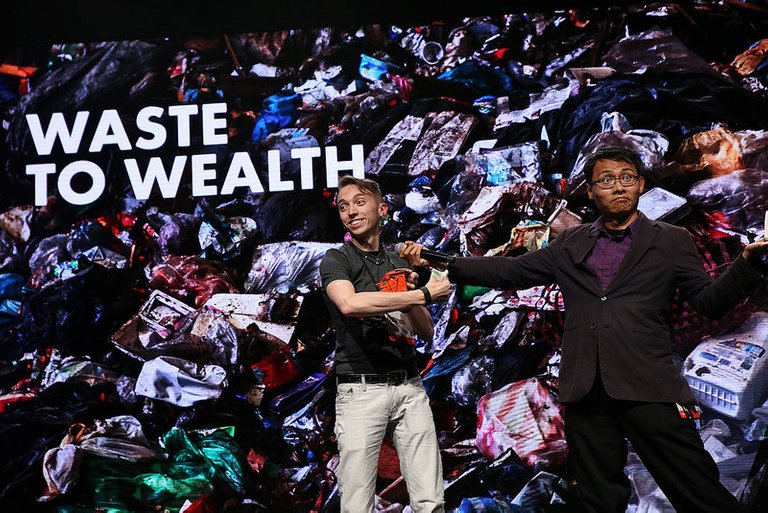
This was the third and final humbling moment. I wasn't really bummed out that our project didn't win. Every idea that was selected for the finals was worth pursuing, and if implemented will benefit humanity. So in a way, it doesn't matter who got to win. It's not about any of us, or any of our ideas. It's about positive impact for the human race, and this year's winning project – Human Dignity: build a pack-and-go housing solution that provides efficient water, electricity, and sanitation; a scalable solution, deployable in one day, have a life of at least six months, and be adaptable to multi-terrain and climate conditions — is as good as any.
Beside this minor drawback on the final vote, I've had a thoroughly positive experience all three days. The XPRIZE team was very professional and welcoming, and the attendees were truly amazing and inspiring. In particular, I enjoyed very much working with Tom Wujec, fellow at Autodesk and adjunct professor at Singularity University, who helped facilitate the Future of Work session with me, and idea-jamming with Tom Chi, co-founder of Google X, with whom I ended up presenting the project Waste to Wealth, and Ali Velshi, host of "on Target" on Al Jazeera America, a fantastic person with whom I've had the pleasure of having dinner at the closing ceremony.
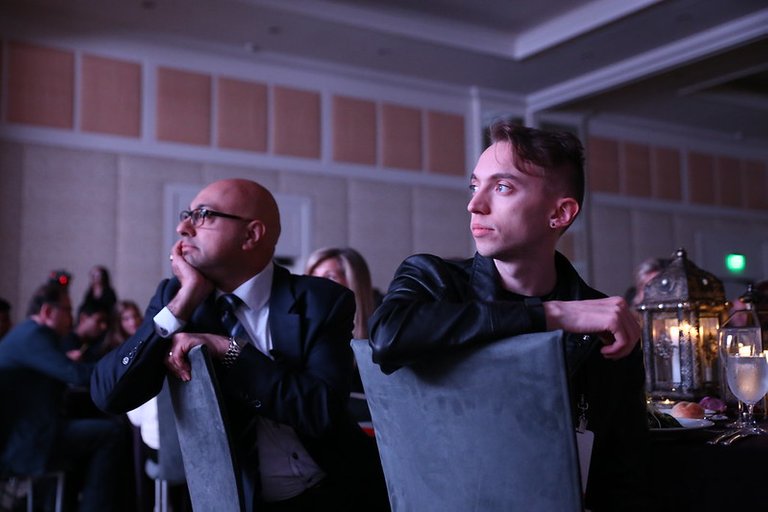
There are many others of course worth mentioning, too many to list on a brief blog post, all change makers, dreamers and doers, who instead of complaining about the state of things, they decided to do something about it.
Visioneers.
Interesting. Thanks for sharing!
These will be the things that change our world in the coming years. Technology seems to be expanding exponentially in the last several decades.
Thanks, @federicopistono. Looking forward to more, following now! =)
Is the XPRIZE VISIONEERING conference an annual conference?
Hats off to @federicopistono for such an inspiring article.
Innovative and encouraging- keep up the great work! upvoted
Interesting. Thanks.
Answer: Change full time employment to 6 hours
I've considered this for some time, and believe that we work too many hours a day to think clearly about many important life issues. To be brief, the solution to your problem is to change the work day to 6 hours instead of 8, while somehow motivating me to positively use the other 2-4 hours.
Ok, as a disclaimer, sometimes I like to give bold simple solutions, and its just the way it comes out.
I don't really know how well this idea would work, but I kind of wonder what would happen if we had more time or self-employment in any number of positive endeavors. What if we accomplished things more creatively and inventively? For me this means, less time cranking away at the dross. My most creative work is done 5-6 hours a day. If I do 8-10 hours, I lose my edge. But I spend some of the other time thinking deeply, looking for solutions, and reinventing myself. (Maybe less hours per person, would cause more jobs to open up, but maybe more because creativity requires many helpers --look at what Steve Jobs did.)
Also, two inventors I admire, are Einstein and the Wright Brothers. Both of these seemed to come up with their world-changing ideas, while they were off the clock, but they still had useful employment which sharpened their minds.
Thanks for sharing your vision with us, @federicopistono!
@federicopistono Thanks! It seems that you and I focus on very similar things. I want to help create a world of abundance 4 everyone.
I just wrote a small post regarding technological unemployment.
FACT or FICTION?
One of my biggest concerns is the transition period as we head towards abundance - I don't want to see anyone hurt or in pain.
Can we say for certain, at this moment in time, that this will be a smooth transition into abundance as more and more robots come to steal our jobs?
Or, is there still much more work to be done to ensure the smoothest path towards abundance?
I suspect that the world needs a lot more people like you.
More projects like konoz, etc.
I want to talk with you more about all of this to see how I can best help create a world of abundance 4 everyone!